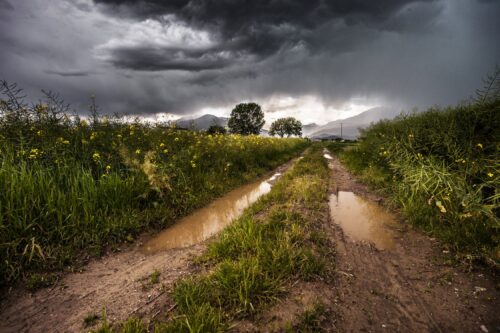Imagine standing on your porch as the first few drops of rain fall from the sky, bringing with them that distinct, earthy aroma. It’s a scent that’s difficult to describe, yet instantly recognizable to almost everyone.
This captivating phenomenon has intrigued scientists and poets alike for centuries, and recent research has begun to unveil the intricate science behind it. The smell of rain, known as “petrichor,” isn’t just a pleasant experience; it has the power to evoke emotions, trigger memories, and even influence our cognitive processes.
As we delve into the fascinating world of petrichor, we uncover not only the chemistry responsible for its creation but also the profound impact it has on our brain and overall well-being. In this article, we’ll explore the hidden secrets behind the smell of a rainstorm and delve into the neurological and psychological responses it elicits in us.
The Enigmatic Aura of Petrichor
Petrichor, a term coined from Greek roots where “petros” signifies stone and “ichor” denotes the divine fluid coursing through ancient gods’ veins, encapsulates the earthy scent that blankets the atmosphere after rainfall, especially following dry spells. Mineralogists Isabel Joy Bear and Richard Thomas introduced this term in 1964, unknowingly igniting widespread fascination.
Though petrichor consistently emerges as a beloved natural fragrance for many, the reason behind its magnetic appeal remained a puzzle until recently. In an illuminating study in 2020, researchers unveiled that the beguiling scent of petrichor isn’t exclusive to humans; it also exerts an irresistible charm on a variety of other animals.
The Seductive Influence of Geosmin
The captivating answer lies in the presence of a ubiquitous soil bacterium known as Streptomyces, which generates a compound named geosmin. This particular compound shoulders the responsibility for the irresistible fragrance that inexplicably entices us.
Astonishingly, our senses exhibit an enhanced sensitivity to geosmin, effortlessly detecting even minute traces, outperforming even sharks’ uncanny ability to sense blood in water. Streptomyces bacteria produce geosmin to attract critters, ranging from insects to larger animals, inadvertently making them carriers for the bacteria’s spores, thus aiding their wide distribution.
During rainfall, as elucidated by researchers in a 2015 study, water droplets striking the ground capture pockets of air within the soil’s pores. These air pockets escape the water’s embrace, transforming into minuscule aerosols carrying remnants of their contacts, including geosmin.
Riding on the wind, these aerosol particles journey great distances, sometimes heralding the arrival of rain clouds themselves. When we catch a whiff of impending rain, it’s most likely these aerosols that our noses are detecting. This process also accounts for the presence of bacteria in the upper atmosphere, carried aloft by the sweeping gusts.
 Another pivotal contributor to the scent of imminent rain is ozone. Unlike petrichor’s earthy aroma, ozone boasts a subtly sweeter fragrance. Consisting of three oxygen atoms, ozone’s name originates from the Greek “ozein,” meaning “to smell.”
Another pivotal contributor to the scent of imminent rain is ozone. Unlike petrichor’s earthy aroma, ozone boasts a subtly sweeter fragrance. Consisting of three oxygen atoms, ozone’s name originates from the Greek “ozein,” meaning “to smell.”
While it occurs naturally in the atmosphere, ozone can also emerge due to artificial factors like fertilizers or pollutants. An electrical charge—emanating from lightning or human-induced sources—can birth ozone by splitting nitrogen from oxygen molecules. Following interactions with other atmospheric constituents, certain molecules may recombine, eventually forming nitric oxide, which metamorphoses into ozone.
A downdraft preceding an impending storm can usher ozone downwards, bringing it closer to the earth’s surface and rendering it detectable by our senses. This process materializes because lightning within a storm can cleave nitrogen and oxygen molecules in the atmosphere, resulting in the creation of nitric oxide.
This compound then reacts with other chemicals, culminating in the formation of ozone. The distinctive aroma of ozone becomes a clear harbinger of an approaching thunderstorm.
How Does Rain Effect Our Senses?
The smell of rain can have a profound impact on our senses and emotions. When we catch a whiff of this unique scent, several sensory and cognitive responses are triggered:
- Nostalgia and Memory: The smell of rain often triggers feelings of nostalgia and memories associated with past rainy days. This phenomenon is linked to the brain’s limbic system, which is responsible for emotions and memory. The scent can evoke vivid recollections of places, people, and experiences, transporting us back to moments in time.
- Emotional Response: The smell of rain is often described as soothing, calming, and refreshing. It can have a positive effect on our mood, reducing stress and anxiety. This emotional response might be due to the natural connection between rain and the nurturing, life-giving aspects of nature.
- Heightened Awareness: Our senses become more attuned to the environment when we smell rain. The distinct aroma can increase our awareness of the weather and our surroundings. This heightened attention might be an evolutionary trait, helping us adapt to changing conditions and potential threats.
- Mindfulness and Presence: The smell of rain can encourage mindfulness and being present in the moment. As we stop to savor the scent, we become more attuned to our immediate surroundings, promoting a sense of mindfulness and helping us momentarily detach from our thoughts.
- Cognitive Stimulation: The scent of rain can stimulate cognitive processes and creativity. It can act as a sensory trigger that enhances mental clarity and encourages introspection, making it an ideal backdrop for reflection or creative thinking.
- Physical Sensation: The scent of rain can also have a physical impact on our senses. Some people might feel a tingling or pleasant shiver when they catch the first whiff of rain, which could be attributed to a combination of the scent itself and the emotional response it elicits.
- Connection to Nature: Rain is a vital element of nature, essential for life to flourish. The smell of rain can deepen our connection to the natural world and remind us of our place within it. This connection can lead to feelings of awe and wonder.
Overall, the smell of rain engages our senses on multiple levels, intertwining emotional, cognitive, and physiological responses. It serves as a bridge between our inner experiences and the external environment, reminding us of the intricate relationship we share with the world around us.
The Intricate Dance of Rain, Bacteria, and Ozone
In a captivating interplay, Streptomyces, ozone, and rain collaborate to orchestrate a sensory marvel that doubles as a natural weather gauge. The presence of geosmin, fostered by Streptomyces bacteria, combined with ozone’s distinctive aroma, offers a remarkable method for anticipating rain, even before the initial droplet falls.
Harnessing Your Innate Rain Detector
So the next time you venture outdoors, inhale deeply, and sense the fragrance of impending rain, trust your instincts. Acknowledge that the inviting petrichor scent is an outcome of Streptomyces bacteria generating geosmin to beckon creatures and further their spore dissemination.
Embrace the tang of ozone as an unmistakable harbinger of an impending downpour, born from the electrical energies of an imminent tempest. The interweaving of these elements encapsulates the intricacies of our environment, warranting appreciation each time you catch the scent of rain in the breeze.
Scented Rain – Factual Reality, Not Myth
As our exploration reveals, our capacity to sense the approach of rain through scent is firmly grounded in reality, far from a mere trick of the system. The earthy petrichor fragrance, orchestrated by Streptomyces, along with the sweet ozone scent, converges to produce a pre-rain aroma that our senses can detect.
This multifaceted interplay of biological and atmospheric factors not only enables us to anticipate incoming rainfall but also contributes to the allure and enigma of the natural world. The next time you perceive that telltale fragrance heralding impending rain, consider the intricate processes at play, and perhaps have an umbrella on hand, just in case.





